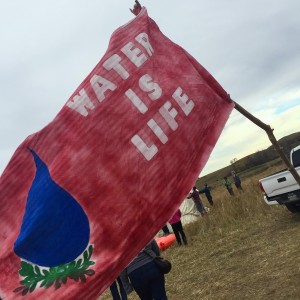American Indian students from UCLA gathered at the Standing Rock Indian Reservation with signs chanting “protectors, instead of protesters.”
“There was one big prayer circle and the ground was there,” said Daniel Streamer, a first-year American Indian studies student. “Everything was peaceful. There’s no violence.”
Students from the American Indian Student Association traveled to North Dakota on Thursday to stand in solidarity as the federal government moves forward with plans to build the Dakota Access pipeline across the Standing Rock Indian Reservation territory. About 1,000 people were present at the event.
AISA is a student organization which comprises American Indian students and aims to educate other students about their culture, said Cesar Barreras, president of AISA and a fourth-year neuroscience and American Indian studies student.
[Related: Yearlong journey lands AISES Rocket Project top prize]
The Dakota Access pipeline is a project that would transport crude oil produced in North Dakota directly to other cities across the country. The pipeline would be built near the Standing Rock Indian Reservation and threaten its sole water resource.
Kirby Lyda, a fourth-year linguistics and anthropology student, said AISA students tutor Native American students to encourage them to go to college. The organization also aims to increase retention of American Indian students. Barreras said 19 UCLA students from AISA spent their weekend in North Dakota holding signs that said “Mni Wiconi”, which translates to “water is life” in the Lakota language. He added he thinks people should not consider their gathering a protest, since it is a protection effort that doesn’t involve violence or weapons. Barreras added two members from the Community Programs Office also accompanied them.

“Land is very important to Native Americans,” Lyda said. “Today, it’s just a place where you live and move. But to Native Americans, it is their way of life, their ancestors, their everything. That’s why we are so passionate about it.”
The student group also fundraised $14,000 in a week for the Standing Rock Sioux tribe, including $336 through a GoFundMe page. Individual students and 10 UCLA organizations donated, Barreras said.
Barreras added the money will help the people of Standing Rock resist the pipeline’s construction.
Puyan Supiliwut, a fourth-year anthropology student, said AISA’s participation in the protest is the first by the UCLA chapter.
Clementine Bordeaux, academic coordinator at the American Indian studies program, said UCLA students helped in North Dakota by cutting wood, contributing financial and item donations and helping teach at the local school. She added they were not present at the front lines, but tried to help in whatever way possible.
“Even though we represent different tribal nations at UCLA, we see ourselves as one,” Barreras said.
[Related: Fashion show to celebrate diversity of Native American culture]
Nikita Bichitty, a fourth-year anthropology student said this experience helped clear up her misconceptions about the protest.
“There was no shouting or screaming,” Bichitty said. “It was peaceful. The elders from the Standing Rock community and other tribes were talking about their teachings and traditions. Kids would listen actively to these stories.”
Vanessa Macadamia, a fourth-year American Indian studies student, said she felt empowered after attending the peaceful gathering.
“I felt really good going there because we were in solidarity with them,” Macadamia said.
Supiliwut added a group of students will be going to Standing Rock during winter to continue the effort.
“We want to be part of that history,” Barreras said. “We’re standing up for what belongs to us.”
Contributing reports from Alexis Lim, Daily Bruin senior staff.
